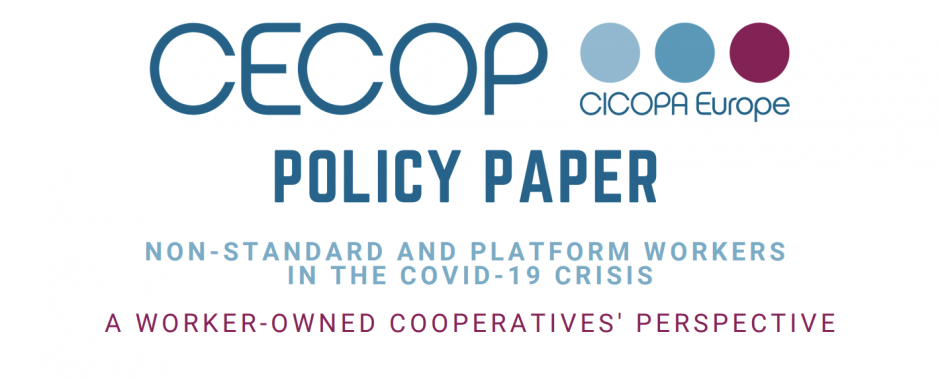A new policy paper by the European confederation of industrial and service co-operatives (Cecop) examines the situation of non-standard workers, including platform workers, during the Covid-19 pandemic.
The paper is based on testimonies from Cecop’s members and argues that non-standard workers, including platform workers, struggled because many national rescue packages failed to address their needs.
Cecop has called on the European Union and its member states to put this right by recognising the potential and needs of all non-standard workers, including platform workers, in their rescue and recovery packages and labour legislation.
The paper finds that Covid-19 impacted various sectors differently. If workers in food delivery, ITC and care saw an increase in demand, those in arts, events, as well as tourism sectors lost most of their incomes.

Workers in these sectors reported an income loss of up to 90%, says Cecop. Smart, one of its Belgian members, reported a cross-sector decline of 50% (during lockdown) compared to the same months of the previous year. Cecop members in Italy also reported a decline of income by 85%, despite government efforts to support the sectors with lump sum payments of up to €600.
While some workers had access to government unemployment schemes, for non-standard workers these schemes often did not cover living costs, because these benefits are based on past income.
“In Italy, these benefits were simply inaccessible to non-standard workers because access criteria were set based on long-term and fulltime employment,” says the Cecop paper. “In combination with a layoff ban that did not allow filing for unemployment, no social security or income is available for these workers that generate their own income from their activities.”
Nor did national rescue packages account for the situations of non-standard workers, adds the report. And workers on short-term contracts in tourism, arts and events sectors had trouble accessing unemployment benefits because it was difficult to prove they had agreed to take work which was subsequently cancelled for lockdown.
While France, Belgium and Germany granted exceptional unemployment benefits to some self-employed workers, Cecop members said these were not always accessible to them. And in Sweden, freelancers facing a decline in demand had to close their businesses to access measures that were or could be considered as unemployment benefit.
Likewise, in Italy, the government granted lump sums up to €1,000 to non-standard workers in arts and showbiz; however, eligibility criteria failed to take into consideration the great diversity of past contracts and related number of working days in the previous year.
Workers with different working statuses (salaried and self-employed) also found it difficult to understand which benefit they could or should opt for, warned Cecop.
Another issue for platform workers was being barred from business support mechanisms, with the report noting the failure of some governments to make a distinction between the activities of the freelancers and those of the co-operative; this was a problem in Belgium, Finland, France, Germany, Sweden and Italy.
Cecop says some co-operatives allowed their freelancers to operate as salaried workers, which meant they could access temporary unemployment benefits, and gave members information on the different support schemes implemented in member states. Some co-ops even tried to set up support schemes on their own.
“Whereas this brought some relief to the workers affected, the delay in authorities’ decision-making and the patchwork character of these regulations led to an increased vulnerability of informal, intermittent and platform workers,” says the report.
Some co-ops were able to articulate the needs of their affiliated workers in their countries, leading to amendments in some national support schemes.
Cecop makes several recommendations in the report – such as ensuring access to social security for non-standard workers, including platform workers, and recognising co-operatives as solutions to challenges arising from all forms of non-standard work, including the platform economy. It also calls for support for co-operatives of non-standard workers facing the Covid-19 crisis.